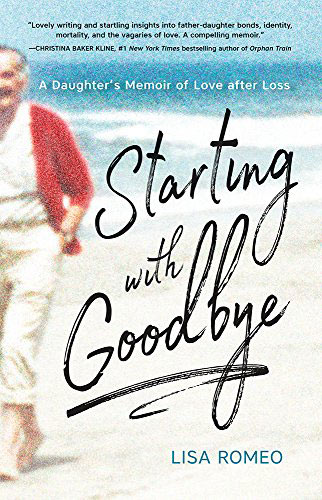Starting with Goodbye
Starting with Goodbye: A Daughter’s Memoir of Love after Loss is a powerful new book by Lisa Romeo about the way our relationships with those we love change and deepen, even after death. Telling the story both of her father’s death and of her need to heal and go forward, this memoir is a moving account of the never-ending love between a father and daughter.
Starting with Goodbye: A Daughter’s Memoir of Love after Loss is a powerful new book by Lisa Romeo about the way our relationships with those we love change and deepen, even after death. Telling the story both of her father’s death and of her need to heal and go forward, this memoir is a moving account of the never-ending love between a father and daughter.
The memoir zigzags between Romeo’s childhood and her adulthood, telling of her family’s early affluence—thanks to her father’s work in the polyester industry—and her adult life, shaped by her marriage, two sons, and a more moderate freelance income.
After his death, Romeo’s father starts to “visit” her, and the two spend moments here and there throughout the book talking. She describes many of these conversations, showing how she and her father expand and develop their relationship.
Here, for instance, is her account of the first of these conversations, while she is at her parents’ home after her father’s death:
We talk.
We talk, my dead father and I.
I know, even at the moment of our first conversation, that the idea is ridiculous. Surely I am talking to myself, to some wishful memory. Yet, there he is, at his marble-top desk at 1:15 a.m. in his Las Vegas house. No, I am the one sitting at his desk. Well, nothing makes sense.
It’s an unusual moment, one that she struggles to make sense of. We as readers also don’t know exactly what to do with this moment, so we must take it at face value and go along for the ride.
After her father’s funeral, she discovers that he comes home with her, and she starts quipping that:
my father has followed me home to New Jersey, and he’s decided to stay for a while. I say that the father who visits me, beginning late that October, is not my imagination, not wishful thinking, not a figment, that somehow, in some other-worldly way, he’s “real.”
This is not the first time that she’ll wonder about the reality of this father-spirit, but as readers, we’re inclined to believe that he is, in some way, “real,” if only because her descriptions of him are so detailed and as vivid as any from her childhood.
The father and daughter have many of these “conversations” over several years, talking of her life, of her struggles and worries, of her need to pay more attention to retirement accounts, of her everyday thoughts and fears. And with each conversation, they grow closer than they ever were in real life.
There’s a kind of magical realism to this memoir, and, ultimately, perhaps it doesn’t matter whether the conversations are “real” or not. What matters instead is the fact that they happen, and through them the narrator finds herself able to grow, evolve, and move forward into her own future as a writer, wife, and mother.
Over the course of time, Romeo begins to change, and it seems that one of the purposes of the visits with her father might be to give him a chance to see how she’s progressing. As she says at one point: “Parents die, and their children continue their lives, sometimes it seems with one singular regret: that their gone parent did not live long enough to see the better version of their child.” Yet she comes to understand her father is proud of her just as she is, and she doesn’t need to accomplish anything in particular to earn his love and respect. As he tells her in a dream, “‘Take it easy, kid,’” assuring her that his love, ethereal as it may be, is unconditional.
In some ways, their conversations are different—deeper and more meaningful—than any they had when he was alive:
My dead father and I begin to have longer, fatty conversations, devoid of the angling and defensiveness that once drove my mother crazy when he was alive. There isn’t time for all that. I never know when these unplanned, haphazard meet-ups will end.
Whether fantasy or reality, in other words, these conversations become an important part of her life after his death.
Eventually, Romeo tells us, the conversations do come to an end. In an epilogue, she describes being at a writing residency and seeing, through her window, a mysterious man fade into the distance between barns and houses: “The last thing I see is his back, and his hand, raised above his head, fingers spread and waving ever so slightly. I can’t tell if it seems like a big hand or not, only that it is open.” This wave, with its simultaneous finality and open-endedness, is a moving way to wrap up a book that’s both about good-byes and about the power of love to transcend them.





